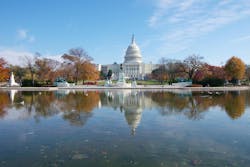2022 has been an especially active legislative year for the water treatment industry. This year alone saw a substantial increase in the number of state bills the Water Quality Association (WQA) is tracking – more than 300 pieces of legislation, up almost 30% compared to 2021. This is partly due to hefty investments in drinking water infrastructure through the Infrastructure Investment and Jobs Act (P.L. 117 – 58) and regulatory actions by the Environmental Protection Agency (EPA), inciting a heightened focus on drinking water challenges and solutions at the state level.
2022 Trends
Federal investments often cascade and impact state legislatures, presenting opportunities for funding remediation and mitigation efforts for drinking water contaminants. Topics influencing the trends in this sector include: Contaminants including lead & Per-and Polyfluoroalkyl substances (PFAS), drinking water in schools & childcare facilities, Extended Producer Responsibility (EPR) initiatives, and private wells. The scope and intended purpose of these themes vary from testing to abatement – through remediation actions, filtration, or the development of water quality standards – as well as to the implementation of new programs.
Across the United States, policymakers have largely focused on two major drinking water contaminants: lead & PFAS. Following in the footsteps of the EPA’s PFAS Strategic Roadmap and schedule to regulate the contaminant by Fall 2023, 75 bills have been introduced at the state level related to the researching, testing, and regulating of these “forever chemicals” found in drinking water. That’s a considerable uptick since 2021 in legislation centered on PFAS (just under 25% of the total bill’s tracking).
PFAS Legislation
PFAS is an especially hot topic in light of the EPA’s updated lifetime non-enforceable Health Advisories (HA) for four PFAS chemicals: PFOA, PFOS, GenX Chemicals, and PFBS. The agency’s June 15 notice dramatically changed the landscape, and the handful of bills aiming to implement state Maximum Contaminant Levels (MCLs) have used the EPA’s 2016 HA for PFOA & PFOS of 70 parts per trillion (ppt) as a guide. With states across the country looking to act on regulating PFAS in drinking water, legislatures have relied on a variety of policy mechanisms, such as offering guidance on these substances as well as Health Advisories, Action Levels, notification requirements, and MCLs. Several bills have implemented laws regulating PFAS, most notably Rhode Island’s passage of H 7233 & S 2298, which sets an interim MCL for PFAS.
Policy Spotlight
RI H 7233 / S 2298 – Effective July 2023, the law requires public water systems to test for PFAS (contaminants including PFOA, PFOS, PFHxS, PFNA, PFHpA, and PFDA) and sets interim drinking water standards for PFAS at 20 parts per trillion (ppt). The law will also require the RI Department of Health to finalize a rule-making on a PFAS MCL by June 2024.
VA HB 919 – Effective July 2022, the bill requires the Board of Health to review and study contaminants in drinking water and establish MCLs for chromium-6, 1-4-dioxane, PFOA, PFOS, and other PFAS chemicals deemed necessary.
FL HB 1475– Effective June 2022, the bill requires the Florida Department of Environmental Protection (DEP) to adopt statewide cleanup target levels for PFAS in drinking water, groundwater, and soil no later than January 1, 2025, on the condition that the US EPA has not finalized its standards for PFAS.
NH HB 1547 – Effective June 2022, the act aims to establish PFAS soil remediation standards (adding to PFAS regulations in drinking water & groundwater) and the creation of a PFAS Loan Fund and Drinking Water Protection Program: a rebate program to assist impacted private well users with water treatment or connection to public water systems.
By establishing an interim PFAS MCL, Rhode Island joined a variety of other states in implementing water quality standards including the company of Alaska, Arizona, California, Colorado, Connecticut, Delaware, Illinois, Iowa, Kentucky, Maine, Massachusetts, Michigan, Minnesota, New Hampshire, New Jersey, New Mexico, New York, North Carolina, Ohio, and Vermont. A group of other states has issued proposed regulations, including Delaware and Pennsylvania; Virginia and Florida have also enacted laws requiring their respective state departments to establish MCLs.
Almost every state across the US has instilled a policy mechanism, guidance, or regulation on PFAS in drinking water. And until the federal EPA finalizes its rulemaking, this lack of uniformity in regional regulations may present difficulties for implementing effective treatment options, although states like New Hampshire have been relatively proactive in taking into account the need for monitoring, testing, and regulating. Providing funds through state-revolving funds (SRFs) and the creation of grant or rebate programs will be essential in treating PFAS and other health-based contaminants.
Lead in Schools & Childcare Facilities
Lead in drinking water is also arguably one of the most well-known drinking water issues in the public, private, and policymakers’ worlds. Over the past year, WQA’s Government Affairs Department has tracked 98 bills related to lead. Of those, more than half (56%) are specifically related to lead in schools and childcare facilities.
Policy Spotlight
CO HB 1358 – Effective August 2022, the act requires each childcare facility and public school that serves 5th graders and below (on or before May 31, 2023) and 6th through 8th (by November 30, 2024) to test for lead in drinking water sources. The law requires the testing results to be publicly available and requires the installation of third-party certified filters that meet NSF/ANSI standard 53 for Lead Reduction as well as NSF/ANIS standard 42 for particulate removal. The act allocates $2,648,019 to support with the implementation.
NY A 8833 / S 7840 – Effective February 24, 2022, the bill requires lead testing in school buildings. The law also outlines notification and abatement efforts including the use of filters or other effective remedial measures for lead contamination. The law does require remediation measures to be approved or reviewed by a professional with expertise in water quality.
UT HB 21 – Effective May 4, 2022, the law requires schools and child care centers to conduct water quality testing for lead. The bill outlines that if testing results show an exceedance of the Action Level for Lead (AL) of 5 ppb, then actions are required to reduce the Lead level below the AL.
NH HB 1421 – Effective July 8, 2022, requires public, and private schools and licensed child care facilities to install water bottle filling stations or test and remediate all water outlets at the facility. The bill specifies that the water bottle filling stations should be designed to remove lead or add an additional filter to remove lead. The bill allocates $7,760,000 through June 2023 to assist with implementation.
NH SB 233 – Effective September 5, the bill sets requirements for the installation of water bottle filling stations in public schools to dispense clean and filtered drinking water
MO SB 681 – Effective in 2023, the bill establishes the "Get the Lead Out of School Drinking Water Act", requiring schools to provide drinking water with a lead concentration of 5 ppb or below. The act requires the testing, monitoring, and use of filters for compliance.
WV SB 246 – Effective in June 2022, the bill requires public schools to install water bottle filling stations dispensing filtered drinking water.
HI SB 3098 / HB 2130 – Effective May 2022, the bill appropriates $1,850,000 for lead abatement measures including the repair or replacement of plumbing fixtures in elementary schools.
Testing and monitoring drinking water contaminants are vital to ensuring the health and safety of the public. However, there is a fundamental difference between a policy with good intentions and sound policy. CO HB 1358 is a prime example of sound policy, embodying the EPA 3T’s method – testing, training, and taking action. The law ensures that funds will go toward certified filter technology. Other states, as mentioned above, lack clarity on the definition of “filtered drinking water” or do not explicitly call for third-party certification and national standards to safeguard the public and children from Lead.
When crafting legislation, state legislatures should look to create an inclusive environment, engage with local stakeholders, and align policy with scientific information. Utilizing lay expertise like the WQA and other groups can help support the development of sound policy. As we move into the new year, the WQA Government Affairs team will continue to stay active and follow new laws and regulations at the state and federal levels.



